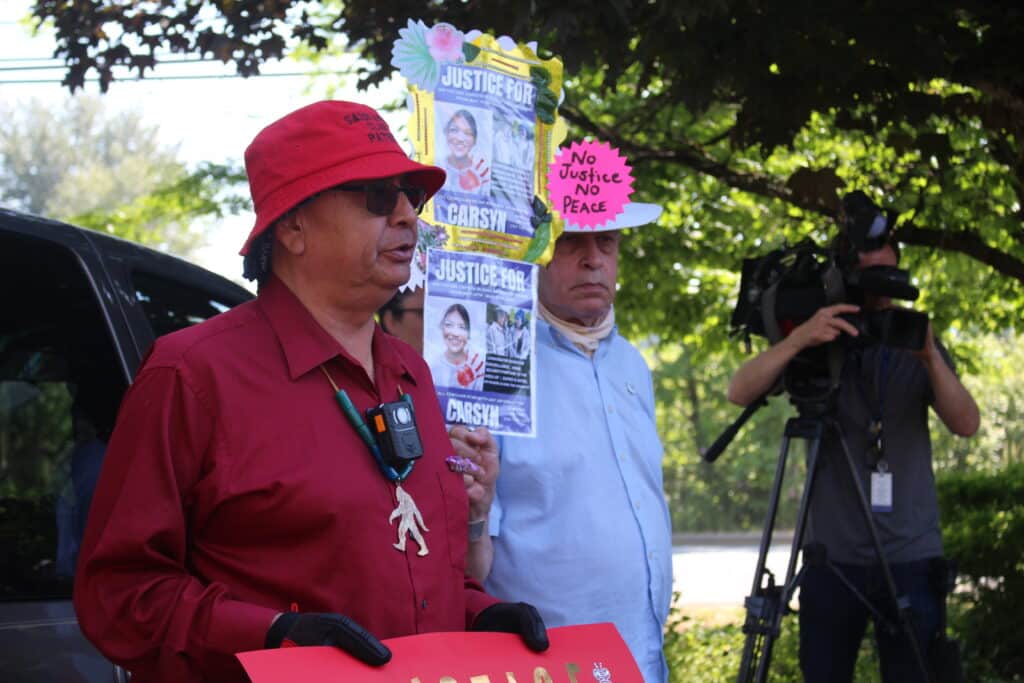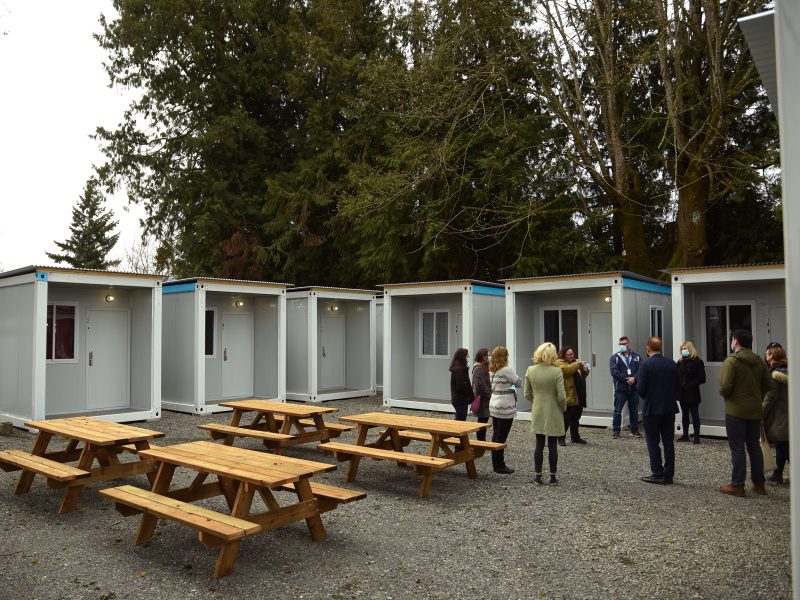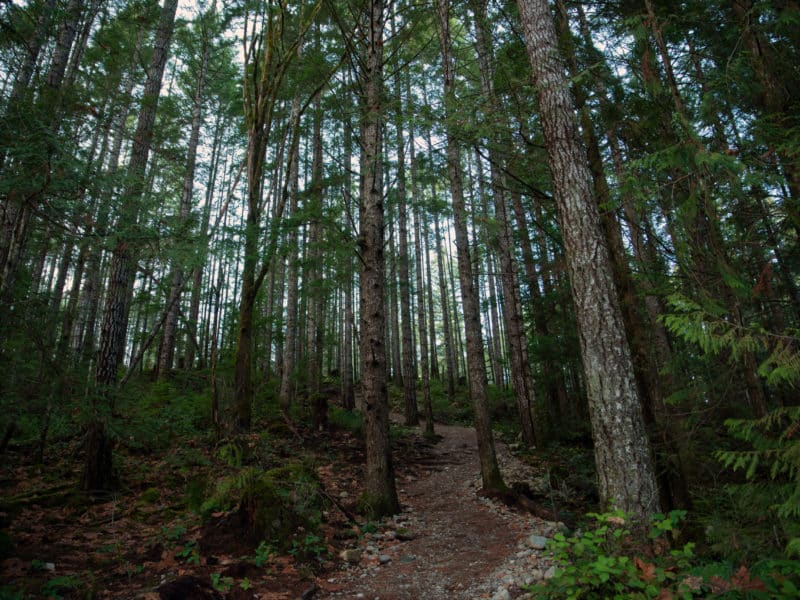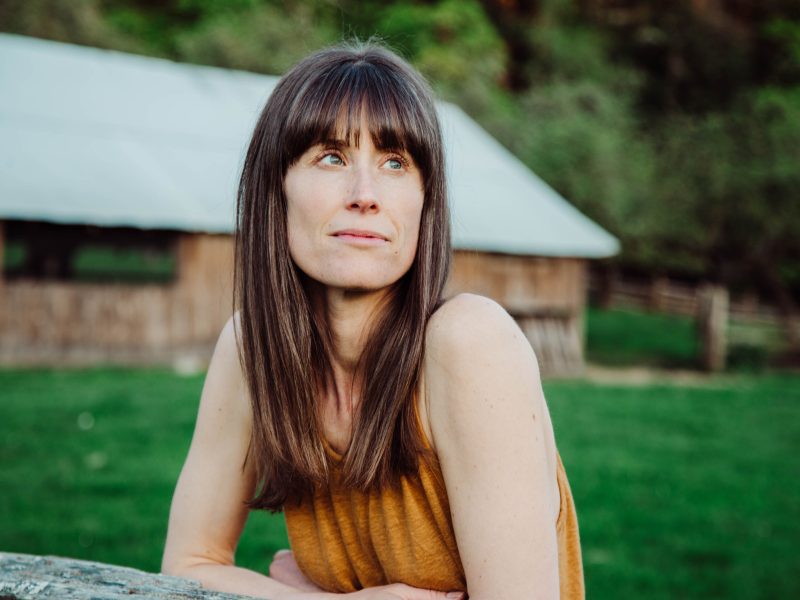
CONTENT WARNING: This story includes content regarding Canada’s ongoing genocidal epidemic of MMIWG2S+. Please look after your spirit and read with care.
As community members gathered and marched on Quw’utsun’ lands on May 31 in memory of Carsyn Mackenzie Seaweed, calls for relationship building with RCMP and a change to how colonial systems handle cases of missing and murdered Indigenous people permeated the event.
Carsyn Mackenzie Seaweed, a 15-year-old Na̱mǥis and Quw’utsun’ girl, was found in a “semi-conscious state under suspicious circumstances” on May 15, according to North Cowichan/Duncan RCMP. She died after being found. But police initially told the Cowichan Valley Citizen there was no criminality suspected in her death.
That statement rippled through the community, sparking a rally at the North Cowichan/Duncan RCMP detachment on May 26 to demand justice for Carsyn. It was there that North Cowichan/Duncan RCMP Insp. Chris Bear told community members and reporters that the statement was a “miscommunication.” He apologized to Carsyn’s family and confirmed that police have been investigating “since the onset.”
But when a community member and The Discourse posed questions to Bear regarding RCMP training related to the National Inquiry into Missing and Murdered Indigenous Women and Girls, his responses were vague. The Discourse sent follow-up questions via email to RCMP media officers and received a lengthy response, detailing available training and apologizing again for harm caused by the initial statement regarding Carsyn’s investigation.
Carsyn’s mother, Marie Seaweed, has asked that no animosity be directed towards RCMP. And march co-organizer Joe “Bingo” Thorne called for a “coming together” to build trust and better relationships with RCMP. At the same time, others at the march and RCMP rally spoke of the harms caused by the miscommunication and demanded better investigations and resources to reduce harm and ensure Indigenous people have a voice amongst these colonial systems.
“They lost their daughter and then all of a sudden they’re told it’s unsuspicious, that hurts the whole family,” said Adrian Sylvester, a relative of Carsyn’s and an organizer of the rally at the RCMP detachment. “To hear something like that would hurt anybody, big time. The family has gone through enough as it is. It totally shocked everyone.”

Missing and murdered inquiry calls for justice
The website of the National Inquiry into Missing and Murdered Indigenous Women and Girls states that “First Nations, Inuit, and Métis women, girls, and 2SLGBTQQIA people live with an almost constant threat to their physical, emotional, economic, social, and cultural security.” Survivors of violence told the inquiry about experiences with police and justice systems, highlighting “disconnections between Indigenous people and justice systems that compromise their basic right to justice.”
The inquiry’s Calls For Justice make specific demands to change and improve police services, justice systems and supports that are available to Indigenous people. Acknowledgement of fraught historical and current relationships between Indigenous women, girls and 2SLGBTQIA+ people with the justice system – due to colonialism, racism, bias, discrimination and cultural differences – is called for, as are improved and trauma-informed approaches to policing, service delivery and communication.
The Calls For Justice document demands the development of working relationships between police and Indigenous Peoples that are based in understanding and respect. Other calls include a revision of policies and practices to ensure service delivery is culturally appropriate and free of bias and racism; ensuring Indigenous representation on police services, boards and oversight authorities; and training and education of all staff and officers so they can implement “culturally appropriate and trauma-informed practices, especially when dealing with families of missing and murdered Indigenous women, girls and 2SLGBTQIA people.”
The report calls upon all police services to follow standardized protocols and policies to ensure all cases of missing and murdered Indigenous women, girls and 2SLGBTQIA+ people are thoroughly investigated. This section includes establishing better communication practices with Indigenous communities and families of missing and murdered people that is ongoing throughout the investigation.
What are RCMP doing?
At the North Cowichan/Duncan RCMP detachment rally on May 26, a community member asked Insp. Chris Bear if RCMP’s response to Carsyn’s death was “compliant with the recommendations of the [report] on murdered and missing [Indigenous] women.” Bear responded, saying he couldn’t go into detail about the investigation but that it was “very much being investigated.” The community member followed up, asking if he could speak generally about the “competency or practice standards” that the detachment has to comply with recommendations from the report.
“Yes and our investigators are doing a good job that has oversight from Island District as well as major crimes unit that is aware of it and we are liaising with it as well,” Bear responded.
When asked by The Discourse if officers at the detachment have any specific training related to the National Inquiry into Missing and Murdered Indigenous Women and Girls, Bear said he wasn’t able to comment on that.

An emailed statement from Cpl. Alex Bérubé, who works in media relations for RCMP, said that “RCMP fully support any action that will benefit Indigenous communities, address the issue of missing and murdered Indigenous women and girls and also to reduce violence.” He linked to an RCMP web page that highlights actions and initiatives being taken by RCMP to respond to calls from the National Inquiry into Missing and Murdered Indigenous Women and Girls Final Report and strengthen relationships with Indigenous communities.
The Discourse reached out again, seeking more information on what specific training looks like for RCMP employees.
Senior media relations officer Staff Sgt. Kris Clark responded, saying there is an “extensive library of training topics” available online for RCMP employees. This includes a course that educates trainees on how to use a trauma-informed approach when conducting investigations and another that helps employees understand how culture and personal identity impact actions, perceptions, interactions and experiences. These courses are mandatory, Clark said.
There is also a course specific to missing persons cases and a module of it is dedicated to “specific investigative considerations of a missing Indigenous person case,” Clark said. In it, investigators learn about their own personal biases, too. At the Canadian Police College Police Science School, a course on human trafficking investigations was updated in 2021 with specific content related to human trafficking of Indigenous women and girls as a direct response to recommendations from the National Inquiry into Missing and Murdered Indigenous Women and Girls report.
More specific to North Cowichan/Duncan RCMP, Clark said the detachment has developed “strong relationships with the local Indigenous communities through years of mutual consultation, discussion, participation, exchange and inclusion.”
“The RCMP is committed to give a voice to the truth by listening and learning about the rich and diverse cultures, experiences and stories of all Indigenous peoples.,” Clark said. “We will continue to work closely with Indigenous leaders, and their communities, to build a trust that was lost through past policies and actions.”
In early 2023, Clark said North Cowichan/Duncan RCMP also began a reconciliation project with Cowichan Tribes and VIU to create an Indigenous Awareness Program. Thirty RCMP and municipal staff attended the program with “positive feedback,” Clark said, and there are plans to run it for all North Cowichan/Duncan RCMP employees.
The very first open town hall meeting with Cowichan Tribes and RCMP took place in March, Clark said. The meeting helped inform policing priorities and additional town halls have been planned.
Trauma-informed communication
Clark said initial communication about Carsyn’s case “was not reflective of the investigation, which was forging ahead as was appropriate, considering the suspicious circumstances.” Carsyn’s case was unique, Clark said, because circumstances surrounding her death are suspicious but the actual cause of death does not suggest criminality is involved. Police continue to assist the BC Coroners Service with the investigation.
“Our initial responses to media spoke too narrowly, specifically focusing only on her cause of death rather than the totality of the investigation,” Clark said. “While our messaging to the public erred, our communication with the family started immediately from the outset of the investigation and they have remained fully informed as the investigation has progressed.”
Clark reiterated the apology from RCMP to family, friends and community for any harms police actions have caused.
The Discourse specifically asked what police could have done differently to minimize harm caused by the initial miscommunication from police, as well as what training media liaison officers receive to respond and communicate in a trauma-informed way. There was no direct response to these questions, but Clark said that in public interactions, “RCMP employees are guided by the RCMP’s Bias-Free Policing policy, which is based on the principles of equity and non-discrimination, as well as the Canadian Charter of Rights and Freedoms, the Canadian Human Rights Act, the RCMP Act and the RCMP’s mission, vision and values.”
Community, family calls for change
Before the May 31 march for Carsyn, Cowichan Tribes Chief Lydia Hwitsum noted that harm to Indigenous people – particularly Indigenous women and girls – has been ongoing for generations. She said that colonial institutions like RCMP should educate themselves on their history and their relationships – past and present – with Indigenous people.
“When I talked to officers today I said ‘make sure you know what the history is and the role the RCMP has played because it’s critical for each of them in their roles to ensure that they’re breaking those stereotypes down and calling out when they hear prejudice in their organizations,’” Hwitsum said.

After the march, Cowichan Tribes Council Member Howie George called for more RCMP, more investigations and more funding.
“If we had the funds we’d definitely put out the investigations ourselves,” George noted, saying that the community needs to work together to address the ongoing crisis of missing and murdered Indigenous people.
Chief Rick Johnson of the Kwikwasut’inuxw Haxwa’mis First Nation, and a family member of Carsyn’s, travelled to the Cowichan Valley from Alert Bay for the march alongside many of her other family members.
He said the family wants answers and, more broadly, that First Nations want to be part of the decision-making process when it comes to investigations like this one and when it comes to reconciliation.
“That process is a square process and our way is a circle and we can’t quite fit in there,” Johnson said. “We need to find the tools so that when tragedies happen to our families … that the process is going to be fair to First Nations.”
Johnson spoke of the love and respect that is foundational for Indigenous cultures across the country, noting that the hundreds who came to march for justice for Carsyn did so out of respect and love. He said the family and community wants justice.
“The very basics of reconciliation is for First Nations to have a voice and we’re asking that from the powers that be,” Johnson said. “It’s not much. We’re asking that resources be put forward to the family, to the Cowichan Nation here so an investigation can happen.”



